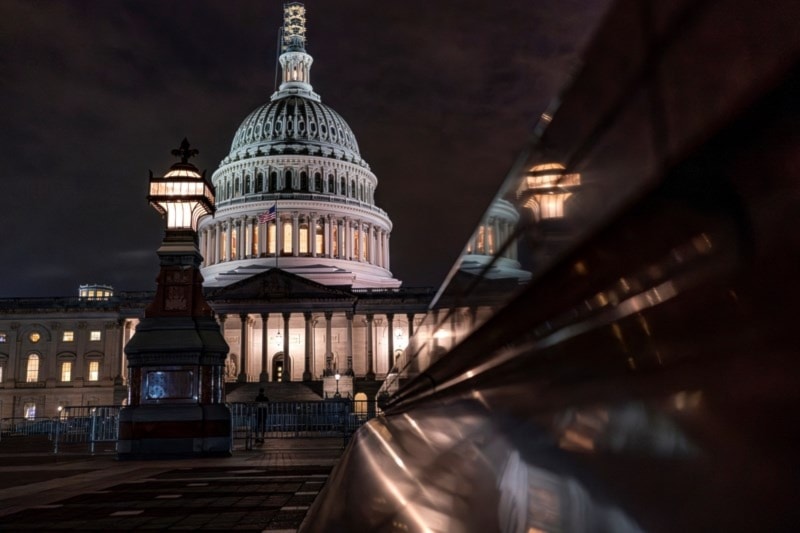Congress extends federal budget, again, to avert government shutdown
The potential shutdown would have impacted approximately 70% of US government agencies and departments.
-

The capital is seen late September 26, 2023, in Washington as lawmakers work to advance appropriations bills on the House floor. (AP)
An agreement has been reached by Democrats and Republicans in the US Congress on Saturday to stretch out the federal budget through September to fend off the threat of a government shutdown.
Although Senators failed to meet the midnight deadline to approve the $1.2 trillion package aimed at sustaining various essential government agencies, they later voted in the early hours to endorse a resolution that the House had previously approved.
"It wasn't easy, but tonight our persistence has been worth it," Democratic Majority Leader Chuck Schumer remarked on the Senate floor following hours of intense negotiation.
"It is good for the American people that we have reached a bipartisan agreement to finish the job," he stressed prior to the bill's ultimate approval.
Dive deeper
A day of significant tension unfolded on Capitol Hill when the House of Representatives approved a $1.2 trillion package of six bills on Friday afternoon, representing the largest and most contentious portion of federal funding.
With funds dwindling and a midnight deadline looming for three-quarters of the government, including defense and homeland security, the Senate found itself racing against time to advance the legislation to President Joe Biden's desk.
However, budget negotiations appeared to be faltering, as both sides sought to modify the legislation to align with their respective campaign messages and priorities ahead of the November presidential election, where Biden will compete against former President Donald Trump.
Senators were on the verge of adjourning without reaching a deal on scheduling a vote, which would have prompted the White House Office of Management and Budget (OMB) to commence scaling back operations in key federal agencies on Saturday morning.
Nevertheless, a last-minute agreement materialized just as the midnight deadline approached, and the Senate voted to pass the resolution after 2:00 am local time (0600 GMT) in Washington.
The White House said in a statement after the deal was struck, "OMB has ceased shutdown preparations because there is a high degree of confidence that Congress will imminently pass the relevant appropriations and the president will sign the bill on Saturday."
"Because obligations of federal funds are incurred and tracked on a daily basis, agencies will not shut down and may continue their normal operations," it added.
Just hours earlier, Republican House Speaker Mike Johnson had incurred the displeasure of his own party's more conservative members by relying on Democratic votes to push the package through to the Senate.
Marjorie Taylor Greene, a staunch ally of Trump, announced to reporters that she had submitted a "motion to vacate" the Speaker's chair due to Johnson's support of the funding package, which had been negotiated over several weeks of tense discussions between the parties.
This resolution, a seldom-used tactic requiring a simple majority for passage, follows a similar move that led to the removal of former Speaker Kevin McCarthy last autumn. The fallout included weeks of internal strife among Republicans, who rejected numerous potential successors before ultimately settling on Johnson.
The specific timeline for Greene's resolution was not immediately apparent, although any vote to oust Johnson could not occur until April at the earliest, as the House is currently on a two-week recess.
The potential shutdown would have impacted approximately 70% of government agencies and departments. The first 30%, which encompassed areas such as agriculture, science, veterans' programs, transportation, and housing, passed without significant issues last month.
While five of the six bills addressing the remainder of federal spending were relatively straightforward, disagreements over funding for homeland security postponed the agreement's release, initially anticipated the previous weekend.
Republican hardliners expressed frustration over the absence of more stringent border security measures in the package, as well as concerns regarding the overall cost and the rapid pace of negotiations.

 4 Min Read
4 Min Read








